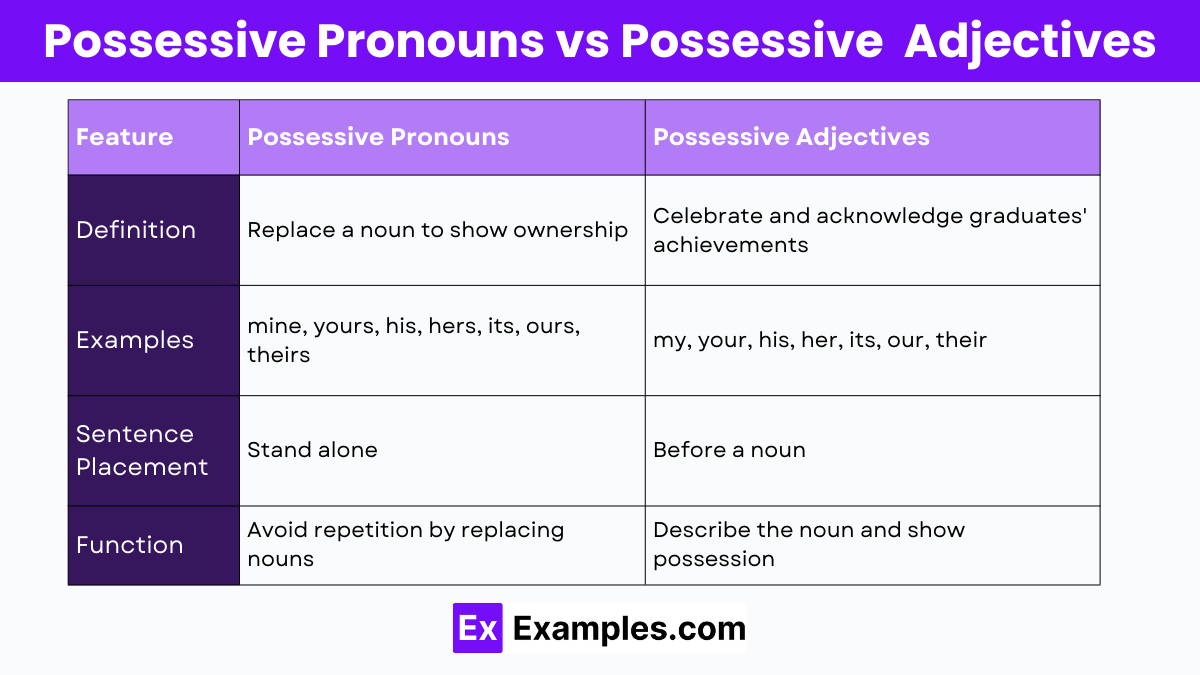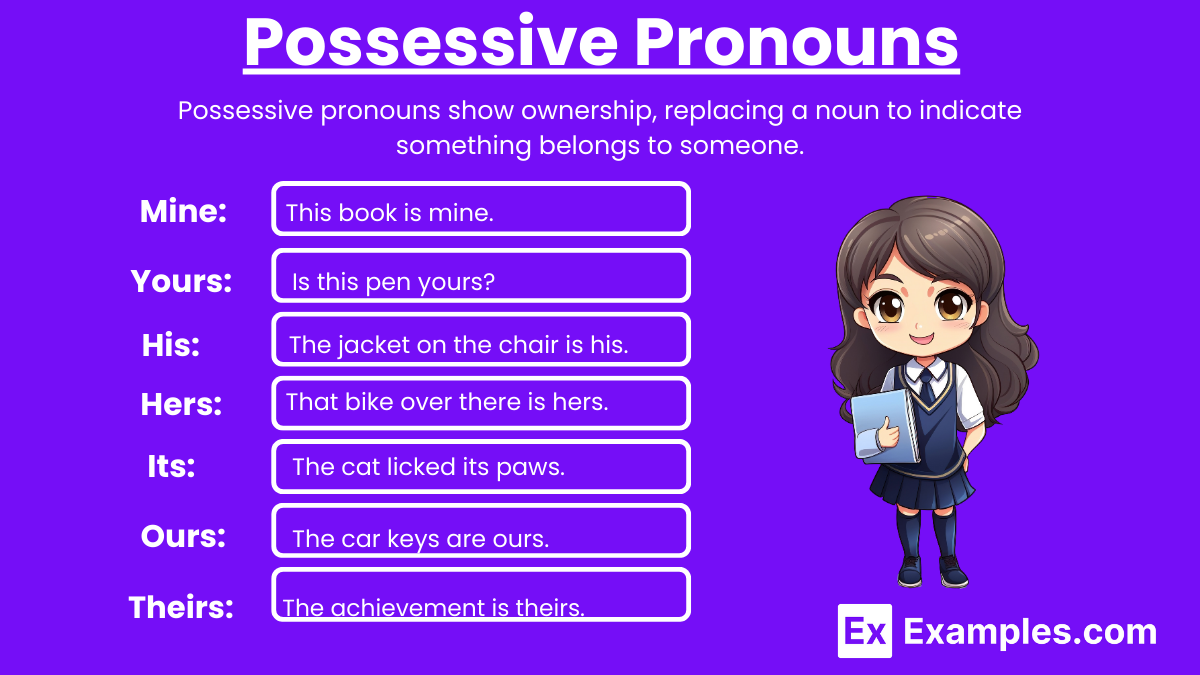70+ Possessive Pronoun Examples
Possessive pronouns are pronouns that demonstrate ownership or possession. They replace nouns to show that something belongs to someone or something, such as mine, yours, his, hers, its, ours, and theirs. These pronouns help avoid repetition and make sentences clearer. For example, instead of saying “That book belongs to Maria,” you can say “That book is hers.” Additionally, possessive adjectives like my, your, his, her, its, our, and their modify nouns to show ownership, as in “This is my book.” Possessive nouns show ownership with an apostrophe and an ‘s’, like “Maria’s book.”
What are Possessive Pronouns?
Possessive pronouns are pronouns that show ownership or possession, replacing a noun to indicate that something belongs to someone. They are used to avoid repetition and make sentences clearer and more concise. The main possessive pronouns are mine, yours, his, hers, its, ours, and theirs.
Examples of Possessive Pronouns
- My
- Mine
- Your
- Yours
- His
- Her
- Hers
- Its
- Our
- Ours
- Their
- Theirs
- Whose
- His book
- Her car
- Their house
- Our team
- My dog
- Your idea
- Their project
List of Possessive Pronouns
- This car is mine.
- Is this pen yours?
- The hat is his.
- The book is hers.
- The cat licked its fur.
- The house is ours.
- The toys are theirs.
- This cup is mine.
- Are these shoes yours?
- The laptop is his.
- The phone is hers.
- The dog chewed its bone.
- The garden is ours.
- The victory was theirs.
- This notebook is mine.
- Is this scarf yours?
- The key is his.
- The dress is hers.
- The bird flapped its wings.
- The car keys are ours.
- The credit goes to theirs.
- The decision was mine.
- The blame is not yours.
- The fault is his.
- The honor is hers.
- The solution is its.
- The responsibility is ours.
- The achievement is theirs.
- This idea was mine.
- Are these documents yours?
- The mistake was his.
- The award is hers.
- The kitten chased its tail.
- The apartment is ours.
- The success is theirs.
- The victory is mine.
- Is this jacket yours?
- The umbrella is his.
- The necklace is hers.
- The company is proud of its achievements.
- The picnic spot is ours.
- The glory is theirs.
- This conclusion is mine.
- Are these gloves yours?
- The responsibility is his.
- The perfume is hers.
- The tree shed its leaves.
- The celebration is ours.
- The rights are theirs.
- The choice was mine.
How to Use Possessive Pronouns
Possessive pronouns replace nouns to show ownership or possession. They help make sentences clear and concise by avoiding repetition. Here are some guidelines:
- Identify the Owner and the Object:
- Use a possessive pronoun to replace the noun that shows ownership.
- Example: “That is Maria’s book.” → “That book is hers.”
- Match the Pronoun to the Owner:
- Ensure the possessive pronoun matches the subject in number and gender.
- Example: “The coat belongs to John.” → “The coat is his.”
- Place the Pronoun Correctly:
- Usually, the possessive pronoun comes after the object it is describing.
- Example: “Is this pen your pen?” → “Is this pen yours?”
- Avoid Repeating the Noun:
- Use possessive pronouns to avoid repeating the same noun.
- Example: “This is my book and that is your book.” → “This is my book and that is yours.”
Possessive Pronouns vs Possessive Adjectives

| Feature | Possessive Pronouns | Possessive Adjectives |
|---|---|---|
| Definition | Replace a noun to show ownership | Modify a noun to indicate ownership |
| Examples | mine, yours, his, hers, its, ours, theirs | my, your, his, her, its, our, their |
| Sentence Placement | Stand alone | Before a noun |
| Function | Avoid repetition by replacing nouns | Describe the noun and show possession |
Possessive Pronouns Sentences
- Her book is on the table.
- The dog wagged its tail happily.
- My phone battery died during the meeting.
- Their house is the largest on the block.
- Is this pen yours or mine?
- His jacket was left in the car.
- The children played with their toys.
- Our team won the championship last year.
- That idea of yours is brilliant!
- Her painting won first prize at the art fair.
- The cat licked its paws.
- My car needs an oil change.
- Their vacation photos were stunning.
- The solution to the problem was his.
- Her advice was invaluable during the crisis.
- Can we borrow your notes for the test?
- Our project was praised by the professor.
- The baby slept in its crib.
- Her smile lit up the room.
- Their laughter could be heard from outside.
- My grandmother’s stories are always fascinating.
- His efforts were recognized by the entire team.
- The bird flapped its wings and flew away.
- The decision to leave was theirs.
- Our garden produces the best tomatoes.
- Your opinion matters a lot to us.
- Her dedication to the cause was inspiring.
- Their car broke down on the highway.
- My favorite color is blue.
- His handwriting is very neat and tidy.
FAQs
How do possessive pronouns differ from possessive adjectives?
Possessive pronouns stand alone (e.g., mine), while possessive adjectives modify nouns (e.g., my book).
Can you use possessive pronouns in sentences?
Yes. Example: “This book is mine, not yours.”
What is the purpose of possessive pronouns?
They indicate ownership and avoid repetition in sentences.
Are possessive pronouns always singular?
No, they can be singular (mine, yours) or plural (ours, theirs).
Is ‘its’ a possessive pronoun?
Yes, ‘its’ shows possession and replaces nouns for non-human objects or animals.
Do possessive pronouns change form for gender?
Yes, ‘his’ and ‘hers’ change for gender. ‘Its,’ ‘ours,’ ‘yours,’ and ‘theirs’ do not.
Are possessive pronouns used in questions?
Yes. Example: “Is this pen yours?”
Can possessive pronouns be used after prepositions?
Yes. Example: “The decision is theirs to make.”
How do possessive pronouns improve sentence clarity?
They reduce redundancy and clarify ownership without repeating the noun.
What is the possessive pronoun for ‘they’?
The possessive pronoun for ‘they’ is ‘theirs.’



